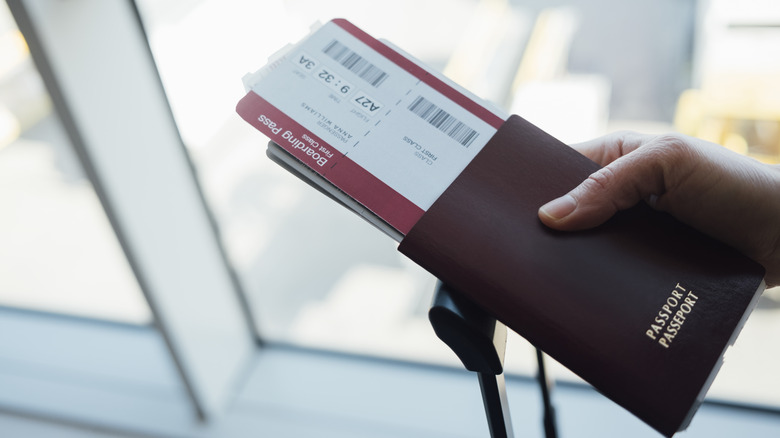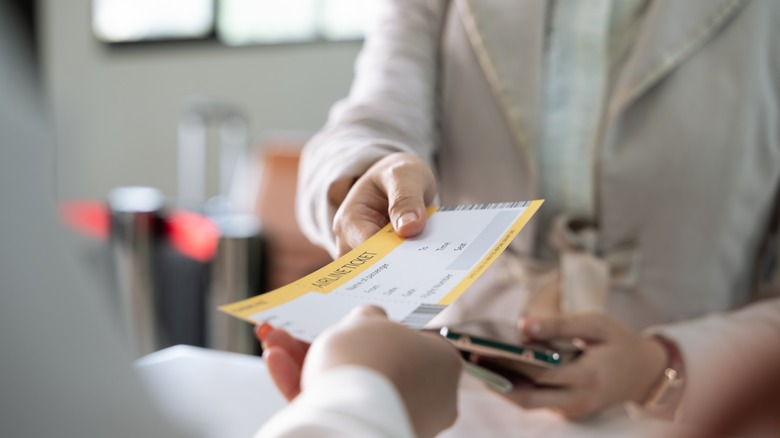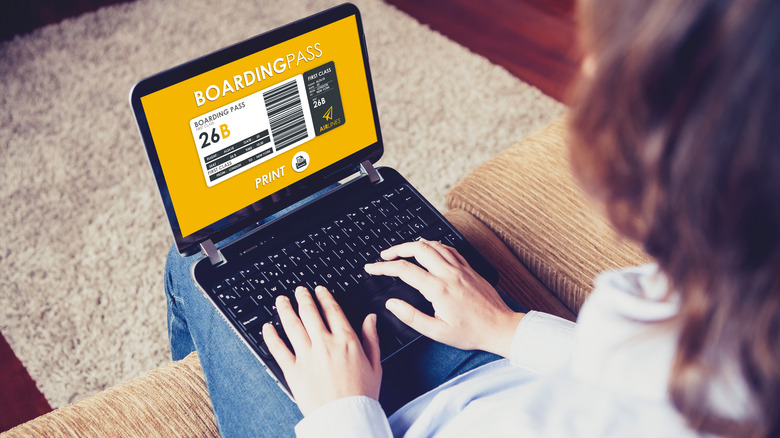Why It's Always Best To Just Print Your Boarding Pass
Your boarding pass reveals more about you than you realize. You might not give it a second look unless you're caught in a delay, but this piece of paper — or its smartphone version — packs crucial details. Along with your name and destination, your boarding pass may note if you have requested a special in-flight meal and need quicker service. It also features your flight number, which means more than you think. Plus, it may include the code "SSSS," which means Secondary Security Screening Selection, mandating you to further checks. Perhaps the most important thing on your boarding pass is the bar code, as it's what grants you entry onto the plane. But while mobile boarding passes have long been ingrained in many a traveler's routine, you might want to revert to the old-school way of printing them, because, well, technical glitches happen.
Ever had your phone die on you at the worst moment? Imagine that happening as you're about to show your boarding pass. Mobile devices can bail on you at any time, whether from a depleted battery or a poor internet connection, making your digital boarding pass inaccessible. One Reddit user even noted that they triggered an immigration incident because of mobile boarding pass problems. "The border guard couldn't work out how to scan the QR code," they recalled. While digital passes are convenient, they're not 100% reliable. Keeping a physical copy as a backup can mitigate stress and ensure smoother travel, sparing you from unexpected complications.
Some airports don't allow digital boarding passes
Air travel innovates at a much faster pace, much to travelers' delight. There is now all sorts of flashy tech available at airports and planes — think state-of-the-art body scanners, facial recognition tech, and the much-celebrated onboard WiFi. Some airports even have TSA self-service security lines, letting travelers zip through without flashing their IDs or boarding passes. Yet, not every airport has embraced modernization. It might be because they're too small to deal with high-tech upgrades or they're still taking time to catch up. And yes, for some of these airports, printed boarding passes are not yet a relic of the past.
Airlines like EasyJet, RyanAir, and Lufthansa have a list of airports on their websites that don't accept mobile boarding passes at this time. Planning a getaway in Marrakech, Morocco? You might want to swap your smartphone screen for a good, ol' physical boarding pass. The same goes if you would be vacationing at a Maldives resort and would be flying in and out of Male. Per Lufthansa, passengers at these airports are given a boarding pass right at the counter, but it's always better to do your homework by contacting the airline so you can come in prepared.
But be sure to print it at home, not the airport
Opting to print your boarding pass at home is a savvy move that could save you more than just time. You can't always expect the airline kiosks to work, and if they do, you might face a long queue. If you ask the service desk to do it for you, you might pay a ridiculous printing fee. Many airlines, especially budget carriers, are notorious for charging an eyebrow-raising amount just to print your pass. Spirit and Frontier charge as much as $25 per pass, while one X user claimed that Ryanair charged their parents a whopping £110 (or around $120) to print two boarding passes. Given the hefty baggage fees, why pile on? In the event that you're caught without a printed pass while already on vacation, your hotel might come to the rescue. Most will print your boarding pass often for free, or at least much cheaper than the airlines' fees.
Once you have the printed copy in your hands, whatever you do, don't share a picture of it on social media. It might be tempting to post for the gram, but remember, your boarding pass packs a ton of personal information. "The risk of being hacked increases drastically when you share too much information about your vacation online," cybersecurity expert Robinson Jardin told Forbes. "When it comes to boarding passes, the real issue is barcodes. They can be read by pretty much anyone with free software online."


